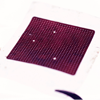

Emphasis
The emphasis is on development of transformative machine intelligence-based systems, emerging tools, and modern technologies for diagnosing and recommending treatments for a range of diseases and health conditions. Unsupervised and semi-supervised techniques and methodologies are of particular interest.
Program priorities and areas of interest:
- clinical decision support systems
- computer-aided diagnosis
- computer-aided screening
- analyzing complex patterns and images
- screening for diseases
- natural-language processing and understanding
- medical decision-making
- predictive modeling
- computer vision
- robotic and image guided surgery
- personalized imaging and treatment
- drug discovery
- radiomics
- machine/deep learning-based segmentation, registration, etc.
Additional support
This program also supports:
- early-stage development of software, tools, and reusable convolutional neural networks
- data reduction, denoising, improving performance (health-promoting apps), and deep-learning based direct image reconstruction
- approaches that facilitate interoperability among annotations used in image training databases
Related News
If there were an unofficial theme of SIR 2024, it might be artificial intelligence—what it is, when to use it and where it might go next. From dedicated sessions to keynote lectures, the possibility of AI and robotics in interventional radiology was a frequent discussion. According to Bruce J. Tromberg, AI is changing the way physicians practice medicine. Source: SIRToday
Researchers developed a wireless implantable device that can monitor bladder filling and emptying in real time and send data to a smartphone. With further development, this type of device could help monitor recovery after bladder surgery and aid patients who have compromised bladder function. Source: NIH Research Matters
NIBIB-supported researchers have developed a smart nanoprobe designed to infiltrate prostate tumors and send back a signal using an optical imaging technique known as Raman spectroscopy. The new probe, evaluated in mice, has the potential to determine tumor aggressiveness and could also enable sequential monitoring of tumors during therapy to quickly determine if a treatment strategy is working.
NIBIB is marking the 10-year anniversary of a commercialization program that helps innovators bring their medical devices from the lab to the marketplace.

While pacemakers have treated many patients with heart rhythm disorders, their bulky design and use of wires limits their usefulness and poses a risk of heart damage or infection. Now, researchers have cut the cords, shrunk the size, and expanded the capabilities of current designs.

